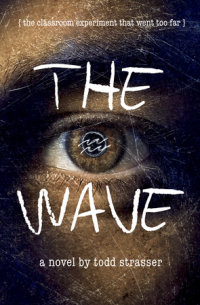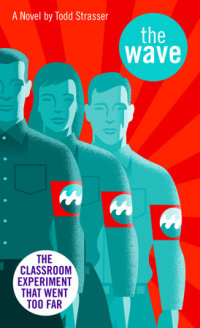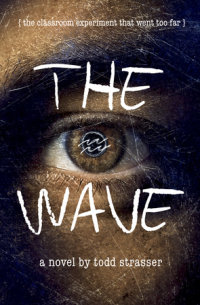Laurie Saunders sat in the publications office at Gordon High School chewing on the end of a Bic pen. She was a pretty girl with short light-brown hair and an almost perpetual smile that only disappeared when she was upset or chewing on Bic pens. Lately she'd been chewing on a lot of pens. In fact, there wasn't a single pen or pencil in her pocketbook that wasn't worn down on the butt end from nervous gnawing. Still, it beat smoking.
Laurie looked around the small office, a room filled with desks, typewriters, and light tables. At that moment there should have been kids at each one of those typewriters, punching out stories for The Gordon Grapevine, the school paper. The art and layout staff should have been working at the light tables, laying out the next issue. But instead the room was empty except for Laurie. The problem was that it was a beautiful day outside.
Laurie felt the plastic tube of the pen crack. Her mother had warned her once that someday she…
Laurie Saunders sat in the publications office at Gordon High School chewing on the end of a Bic pen. She was a pretty girl with short light-brown hair and an almost perpetual smile that only disappeared when she was upset or chewing on Bic pens. Lately she'd been chewing on a lot of pens. In fact, there wasn't a single pen or pencil in her pocketbook that wasn't worn down on the butt end from nervous gnawing. Still, it beat smoking.
Laurie looked around the small office, a room filled with desks, typewriters, and light tables. At that moment there should have been kids at each one of those typewriters, punching out stories for The Gordon Grapevine, the school paper. The art and layout staff should have been working at the light tables, laying out the next issue. But instead the room was empty except for Laurie. The problem was that it was a beautiful day outside.
Laurie felt the plastic tube of the pen crack. Her mother had warned her once that someday she would chew on a pen until it splintered and a long plastic shard would lodge in her throat and she would choke to death on it. Only her mother could have come up with that, Laurie thought with a sigh.
She looked up at the clock on the wall. Only a few minutes were left in the period anyway. There was no rule that said anyone had to work in the publications office during their free periods, but they all knew that the next edition of The Grapevine was due out next week. Couldn't they give up their Frisbees and cigarettes and suntans for just a few days in order to get an issue of the paper out on time?
Laurie put her pen back in her pocketbook and started to gather up her notebooks for the next period. It was hopeless. For the three years she'd been on staff, The Grapevine had always been late. And now that she was the editor-in-chief it made no difference. The paper would be done when everyone got around to doing it.
Pulling the door of the publications office closed behind her, Laurie stepped out into the hall. It was practically empty now; the bell to change classes had not yet rung, and there were only a few students around. Laurie walked down a few doors, stopped outside a classroom, and peered through the window.
Inside, her best friend, Amy Smith, a petite girl with thick, curly, Goldilocks hair, was trying to endure the final moments of Mr. Gabondi's French class. Laurie had taken French with Mr. Gabondi the year before and it had been one of the most excruciatingly boring experiences of her life. Mr. Gabondi was a short, dark, heavyset man who always seemed to be sweating, even on the coldest winter days. When he taught, he spoke in a dull monotone that could easily put the brightest student to sleep, and even though the course he taught was not difficult, Laurie recalled how hard it had been to pay enough attention to get an A.
Now watching her friend struggle to stay interested, Laurie decided she needed some cheering up. So, positioning herself outside the door where Amy could see her but Gabondi could not, Laurie crossed her eyes and made an idiotic face. Amy reacted by putting her hand over her mouth to keep from laughing. Laurie made another face and Amy tried not to look, but she couldn't help turning back to see what her friend was doing next. Then Laurie did her famous fish face: she pushed her ears out, crossed her eyes, and puckered her lips. Amy was trying so hard not to laugh that tears started to roll down her cheeks.
Laurie knew she shouldn't make any more faces. Watching Amy was too funny--anything could make her laugh. If Laurie did any more, Amy would probably fall out of her seat and roll into the aisle between the desks. But Laurie couldn't resist. Turning her back to the door to create some suspense, she screwed up her mouth and eyes, and then spun around.
Standing at the door was a very angry Mr. Gabondi. Behind him Amy and the rest of her class were in hysterics. Laurie's jaw dropped. But before Gabondi could reprimand her, the bell rang and his class was suddenly spilling out into the hall around him. Amy came out holding her sides in pain from laughing so hard. As Mr. Gabondi glared at them, the two girls went off arm in arm toward their next class, too out of breath to laugh anymore.
In the classroom where he taught history, Ben Ross crouched over a film projector, trying to thread a film through the complex maze of rollers and lenses. This was his fourth attempt and he still hadn't gotten it right. Frustrated, Ben ran his fingers through his wavy brown hair. All his life he had been befuddled by machinery--film projectors, cars, even the self-service pump at the local gas station drove him bananas.
He had never been able to figure out why he was so inept in that way, and so when it came to anything mechanical, he left it to Christy, his wife. She taught music and choir at Gordon High, and at home she was in charge of anything that required manual dexterity. She often joked that Ben couldn't even be trusted to change a light bulb correctly, although Ben insisted this was an exaggeration. He had changed a number of light bulbs in his life and could only recall breaking two in the process.
Thus far in his career at Gordon High--Ben and Christy had been teaching there for two years--he had managed to hide his mechanical inabilities. Or rather, they had been overshadowed by his growing reputation as an outstanding young teacher. Ben's students spoke of his intensity--the way he got so interested and involved in a topic that they couldn't help but be interested also. He was "contagious," they'd say, meaning that he was charismatic. He could get through to them.



